|
|
|
Sort Order |
|
|
|
Items / Page
|
|
|
|
|
|
|
| Srl | Item |
| 1 |
ID:
131832
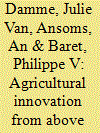

|
|
|
|
|
| Publication |
2014.
|
| Summary/Abstract |
In its 2008 World Development Report, the World Bank pleaded for a 'Green Revolution' for sub-Saharan Africa, pointing particularly to the importance of including smallholder farmers. This article focuses on the banana cropping system in Rwanda, and on the agricultural innovations introduced within this system. We first consider macro-level innovations that are designed to promote a modernized agricultural sector and that correspond to the rationale of the Green Revolution. We analyse how such 'top-down' innovations are received on the ground and show how smallholders seek to evade new government policies when they fail to reflect local economic and social realities. This demonstrates how some rural Rwandans are challenging the authority of the government in disguised ways in order to protect their local livelihoods. The Rwandan experience should inspire continent-wide Green Revolution policies to take account of the risk-coping rationale of small-scale farmers and their capacity to innovate 'from below'.
|
|
|
|
|
|
|
|
|
|
|
|
|
|
|
|
| 2 |
ID:
121371


|
|
|
|
|
| Publication |
2013.
|
| Summary/Abstract |
Biofuels policies and projects may lead to environmental, economic and social impacts. A number of studies point out the need to deliver comprehensive sustainability assessments regarding biofuels, with some presenting analytical frameworks that claim to be exhaustive. However, what is often found in the literature is an overexploitation of environmental and economic concerns, by contrast to a limited appraisal of the social aspects of biofuels. Building on a systematic review of the peer-reviewed literature, this paper discusses the social constraints and strengths of ethanol, with regard to the product's lifecycle stages and the actors involved. Its objective is to contribute to the development of social frameworks to be used in assessing the impact of ethanol. Main findings indicate that ethanol developments can increase the levels of social vulnerability, although there is little evidence in the literature regarding the positive and negative social impacts of 1st-generation ethanol and potential impacts of cellulosic ethanol. Further work is needed on the formulation of social criteria and indicators for a comprehensive sustainability assessment of this biofuel. Policy makers need to internalise the social dimension of ethanol in decision-making to prevent public opposition and irreversible social costs in the future.
|
|
|
|
|
|
|
|
|
|
|
|
|
|
|
|
| 3 |
ID:
122005
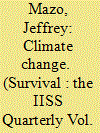

|
|
|
|
|
| Publication |
2013.
|
| Summary/Abstract |
Climate change caused by global warming is, arguably, a serious, even existential, threat to the world order and to the welfare of humanity. No one really knows; there are many uncertainties around the rate of warming and the severity of its environmental and social impacts, and hence the most effective, and cost-effective, ways to avoid or ameliorate them. But over the last five or six years, public discourse has been driven less by policy needs and more by punditry. The propagation of myths and misconceptions, whether deliberate or inadvertent, continues to poison the debate over how to mitigate or adapt to climate change.
|
|
|
|
|
|
|
|
|
|
|
|
|
|
|
|
| 4 |
ID:
132497
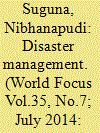

|
|
|
|
|
| Publication |
2014.
|
| Summary/Abstract |
Hundreds of Natural disasters take place worldwide every year causing irreparable damage to life and property. Earthquakes, ?oods, typhoons, hurricanes,- Tsunamis are among the worst of these natural disasters. Over the last few decades, there has been an alarming increase in the occurrence of natural disasters and the magnitude of their social, economic and environmental impact. During any natural disaster it is usually the" children who suffer the most. The nation witnessed the death of nearly a thousand children during the 2001 Bhuj earthquake. Out of them, 300 died while marching for the Republic day parade. They were in a narrow lane when the earthquake hit causing buildings onboth sides to collapse. It is said thatpnearly 1,884 school buildings collapsed leading to a loss of 5,950 class rooms. About 12000 schools suffered damages making them un?t for children to continue their studies. Fire tragedies, like the one in Kurnbakonam killed 93 children in a school. Another ?re accident in Dabwali, Haryana where a ?re broke out during a schoolfunction took he lives of many school children. Children in schools are the 'most vulnerable group during any disaster. These tragedies reiterate the need for all of us to sit up and think about the safety of these children. It is necessary to make schools safe and hazard proof. For this purpose, it is important to have disaster management, emergency preparedness and response plans at school level.
|
|
|
|
|
|
|
|
|
|
|
|
|
|
|
|
| 5 |
ID:
132498
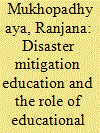

|
|
|
|
|
| Publication |
2014.
|
| Summary/Abstract |
Disasters are increasing exponentially. The number of disaster events which was 73 in 1900-09 has increased to 4494 during 2000-09. More people were affected in the two recent decades than the earlier ones. During the second half of the 20th century, more than 200 major natural disasters occurred in different parts of the world and claimed the lives of around 1.4 million people. In 2011 alone, 302 hazards resulted in disasters that claimed almost 30,000 lives, affected 206 million people and in?icted damages worth an estimated USS 366 billion, according to the United Nations Office for Disaster Risk Reduction.
|
|
|
|
|
|
|
|
|
|
|
|
|
|
|
|
| 6 |
ID:
173243


|
|
|
|
|
| Summary/Abstract |
This article attempts to fill a gap in research on terrorism in the Visegrad Group member states. Its major objective is to discover and understand whether terrorism truly is a serious threat to V4 members. To reach this goal, quantitative and qualitative content analysis is used. The conducted analysis has demonstrated that V4 member states hardly report any arrests or convictions of individuals accused of terrorist activities. The threat of terrorism exists. However, it is definitely less imminent than in the United States or Western European countries. The data indicate that Visegrad members deal with the challenge of non-Islamist terrorism. In Central Europe, left-wing militancy is almost non-existent, and right-wing extremism, though evidently present in the region, is not a major threat in the context of terrorism.
|
|
|
|
|
|
|
|
|
|
|
|
|
|
|
|
| 7 |
ID:
099616
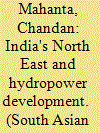

|
|
|
|
|
| Publication |
2010.
|
| Summary/Abstract |
Hydropower, while being projected as a clean and renewable energy source, has time and again been resisted vociferously in North East India in recent times because of the obvious and unintended social and environmental impacts. The anticipated negative impacts of the associated dam and reservoir construction have cast a threat to the security of the indigenous people in terms of water, food, livelihood, energy and above all, the related socio-economic concerns. This is all the more due to the uncertainties flowing from an inadequate understanding of the possible geo-environmental impacts in a highly sensitive terrain. To cope and live with the potential negative ramifications of hydropower projects, a comprehensive hydropower policy with emphasis on long-term environmental and social security and sustainability is imperative.
|
|
|
|
|
|
|
|
|
|
|
|
|
|
|
|
| 8 |
ID:
171206
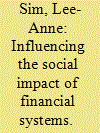

|
|
|
|
|
| Summary/Abstract |
The social impact of the global financial crisis brought global and domestic financial systems into public focus. While over the last ten years governments have introduced a range of regulatory reforms, there are still low levels of public trust in financial sectors, and academics continue to express their concerns about financial systems and their desire for more influence. This is particularly the case for those framing their evaluation of the quality of financial systems in terms of social values. This article offers those seeking more influence over the social values of financial systems, a fresh perspective on their available strategic options for influencing outcomes. It argues that they should consider strategies aimed at making allies of financial sectors and regulators in influencing change. The main advantage of these alliance strategies is that they address key constraints to influence, as identified in existing scholarship, which are difficult to relax because they are tied to features inherent in financial systems. By addressing these constraints, alliance strategies could increase the likelihood that financial system outcomes align more closely with their preferred social values.
|
|
|
|
|
|
|
|
|
|
|
|
|
|
|
|
| 9 |
ID:
121027
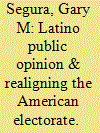

|
|
|
|
|
| Publication |
2012.
|
| Summary/Abstract |
The growth and significance of the Latino electorate raises important questions about its preferences, identity, and impact. In this essay, I explore three facets of Latino public opinion and offer thoughts regarding their political impact. First, I demonstrate that Latino core beliefs about the role of government are progressive. Second, I explore the ways in which national origin, nativity, and generational status reveal important differences in how Latinos think about and participate in politics; I caution against over-interpreting the importance of these differences. Finally, I offer evidence that Latino panethnic identity is sufficiently developed to constitute a political "group." Given that this segment in the American electorate is increasingly unified and demonstrably left of center, I suggest that the growth of the Latino population and electorate could have substantial electoral and social impact.
|
|
|
|
|
|
|
|
|
|
|
|
|
|
|
|
| 10 |
ID:
098657


|
|
|
|
|
| Publication |
2010.
|
| Summary/Abstract |
This paper presents a methodology for the assessment of the impact of existing high voltage lines in urban areas. This methodology is based on the numeric evaluation of several impacts which are combined with weight factors. The novelty is that it opens up the possibility of citizen participation, basically in the way in which impacts and weighting factors are determined. The proposed methodology has been applied first in the municipality of Rubí, a mid-sized town near Barcelona, and later on in several municipalities in the Catalonia region in Spain. The results were used to prioritise mitigation action in the Catalonia Energy Plan.
|
|
|
|
|
|
|
|
|
|
|
|
|
|
|
|
| 11 |
ID:
127650


|
|
|
|
|
| Publication |
2014.
|
| Summary/Abstract |
Despite much research work on the effect of social capital or the production of social capital along ethno-linguistic or racial dimensions, there is hardly any study in this line along the much fragmented character of Indian ethnicity. This article studies the impact of ethnicity along caste and religious dimensions on the growth of social capital in the Indian context. A simple theoretical model indicates that individual ethnicity formed out of individuals' separate pairwise connections with people, who are either of the same ethnic dimension or of different ethnic dimensions, is the only factor affecting endogenous social capital growth. Empirical results suggest that all forms of individual social capital are higher for people who are of the same caste or religion. It also shows that individuals' ethnicity with the same caste or religion is the only factor influencing high performance on the productivity of aggregate social capital in general and nonstructural form of social capital in particular.
|
|
|
|
|
|
|
|
|
|
|
|
|
|
|
|
| 12 |
ID:
160045
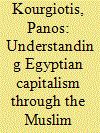

|
|
|
|
|
| Summary/Abstract |
The following article addresses the intricate issue of contemporary Islamist thought’s relation to the modern capitalist economy, with special reference to the Egyptian case. Islamist thinkers have been vigorously proclaiming for the past decades that the economic prosperity of some Muslim nations stems from the proper adoption of an ‘Islamic economy’, whereas the absence of such a model has been mainly responsible for the crises that other nations faced. At the same time, we witness that the Muslim nations are fully integrated into the global market system. Although their rulers boast about achieving social justice, by economically interpreting Islam, nonetheless poverty and horrific injustices are officially retained and morally accepted, thus, enabling the upper classes to keep performing their pious duties in the name of God. In this regard, it seems that capitalism and piety are intertwined: the first justifies the necessity of the second, while the second humanizes the brutal impact of the first. By referring to the historical example of the Muslim Brothers in pre-socialist Egypt, the article tends to show under which circumstances was capitalism’s relation to religious piety conceptualized in Islamist thought and literature, in addition to the main social, organizational and ideological outcomes of this conceptualization.
|
|
|
|
|
|
|
|
|
|
|
|
|
|
|
|
|
|
|
|
|